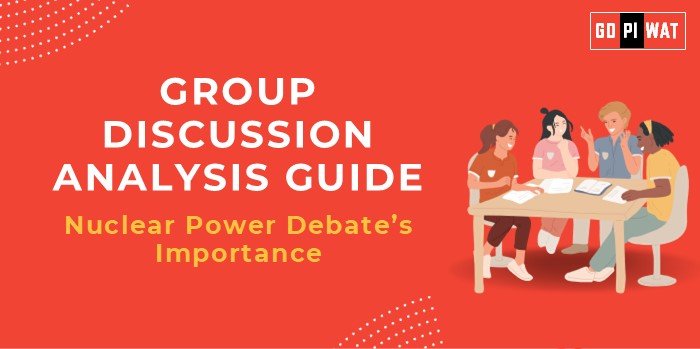📋 Group Discussion (GD) Analysis Guide
🌐 Introduction to the Topic
Opening Context: Nuclear power has long been a double-edged sword in energy production. While it offers a low-carbon alternative to fossil fuels, its potential hazards and long-term waste management issues raise complex environmental and social concerns.
Topic Background: Nuclear energy’s origins date back to the mid-20th century, initially developed for weaponry and later repurposed for energy generation. As of recent years, nuclear energy contributes to around 10% of the world’s electricity. However, incidents like Chernobyl and Fukushima have reignited debates about the safety and viability of nuclear power, especially as renewable energy technology advances.
📊 Quick Facts and Key Statistics
- 🌍 Global Nuclear Power Contribution: 10% of global electricity, highlighting nuclear’s role as a significant power source.
- 💨 CO₂ Emissions: Nuclear power emits close to zero CO₂ during operation, making it one of the cleanest energy sources in terms of emissions.
- ⚡ Number of Operational Reactors: About 440 nuclear reactors operate in over 30 countries.
- ♻️ Waste Longevity: Nuclear waste remains hazardous for thousands of years, requiring complex, long-term storage solutions.
- 💰 Cost of Decommissioning: Estimated at $300 million to over $1 billion per plant, underlining the financial challenges of shutting down reactors.
🤝 Stakeholders and Their Roles
- 🏛️ Government Bodies: Regulate nuclear safety standards and oversee licensing and decommissioning processes.
- 🏭 Energy Corporations: Operate reactors and often influence policy decisions related to nuclear energy.
- 🌱 Environmental Organizations: Advocate for renewable energy alternatives and often highlight the risks and waste challenges associated with nuclear power.
- 🏡 Local Communities: Residents near plants face both employment opportunities and potential risks, making them key voices in the debate.
- 🌐 International Agencies (e.g., IAEA): Set global standards for nuclear safety and provide oversight and guidance.
🏆 Achievements and Challenges
✨ Achievements
- 🌍 Low Carbon Footprint: Nuclear power is a reliable source of low-carbon energy.
- ⚡ High Energy Density: Nuclear power plants require significantly less land than renewable alternatives like wind and solar.
- 🔋 Stable Power Supply: Nuclear provides a consistent base load power source, unlike variable renewables.
⚠️ Challenges
- ☢️ Safety Risks: Catastrophic events like Chernobyl and Fukushima highlight the potential dangers of nuclear power.
- ♻️ Nuclear Waste: Disposal and long-term storage remain unresolved, with waste hazardous for thousands of years.
- 💸 High Costs: Building, maintaining, and decommissioning plants is capital-intensive.
🌍 Global Comparisons
- 🇫🇷 France: Derives about 70% of its electricity from nuclear power, emphasizing safety innovations.
- 🇩🇪 Germany: Committed to phasing out nuclear power by 2022 in response to public safety concerns post-Fukushima.
📚 Structured Arguments for Discussion
“Nuclear power is essential for a stable, low-carbon energy mix, which is crucial to combating climate change.”
“The potential risks and unsolved waste issues associated with nuclear power outweigh its benefits, especially with advancements in renewable technology.”
“While nuclear power is a key low-carbon source, its safety risks and waste challenges call for a cautious, transitional approach.”
🗣️ Effective Discussion Approaches
🚀 Opening Approaches
- 📊 Statistical Impact: “With nuclear energy providing 10% of global power, it plays a significant role in meeting our energy demands sustainably.”
- 🔀 Contrast Approach: “As renewable technology advances, does the high-risk factor of nuclear energy still justify its place in our energy mix?”
- 📖 Case Study Opening: “The Fukushima disaster reminded the world of the potential dangers of nuclear power. However, France’s safe and stable nuclear energy infrastructure presents a contrasting perspective.”
🛠️ Counter-Argument Handling
- ☢️ “While nuclear has risks, the safety protocols today are vastly improved and highly regulated.”
- 🌱 “Renewables are promising but require substantial advancements to replace nuclear’s steady output.”
📈 Strategic Analysis of Strengths and Weaknesses
- 💡 Strengths: Low carbon emissions, stable energy output, high energy density.
- ⚠️ Weaknesses: Safety risks, high costs, long-term waste storage issues.
- ✨ Opportunities: Advanced technology for safer nuclear options, renewable integration.
- ⚡ Threats: Public opposition, catastrophic failure risks, rising costs of decommissioning.
🎓 Connecting with B-School Applications
- 📂 Real-World Applications: Energy policy projects, sustainability initiatives in business, or financial analyses in energy investments.
- 🧐 Sample Interview Questions:
- “How would you balance the energy mix in a way that minimizes environmental impact?”
- “What measures could improve the safety and public perception of nuclear energy?”
- 🌟 Insights for B-School Students: Understanding energy policy, environmental impact assessments, and risk management will be crucial for careers in consulting, sustainability, and project finance.


